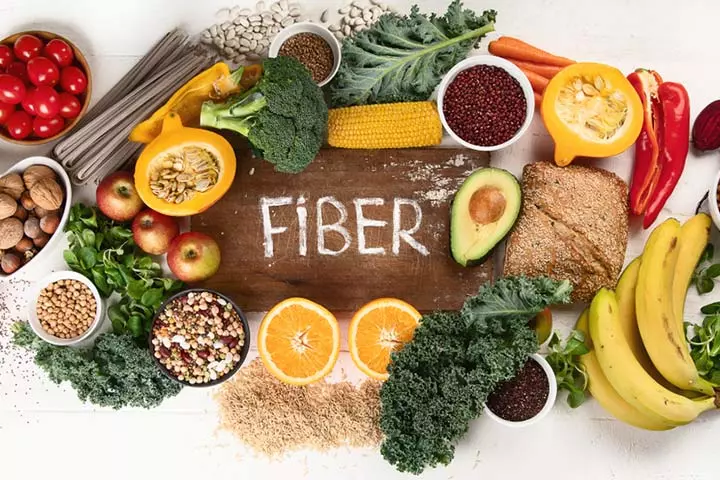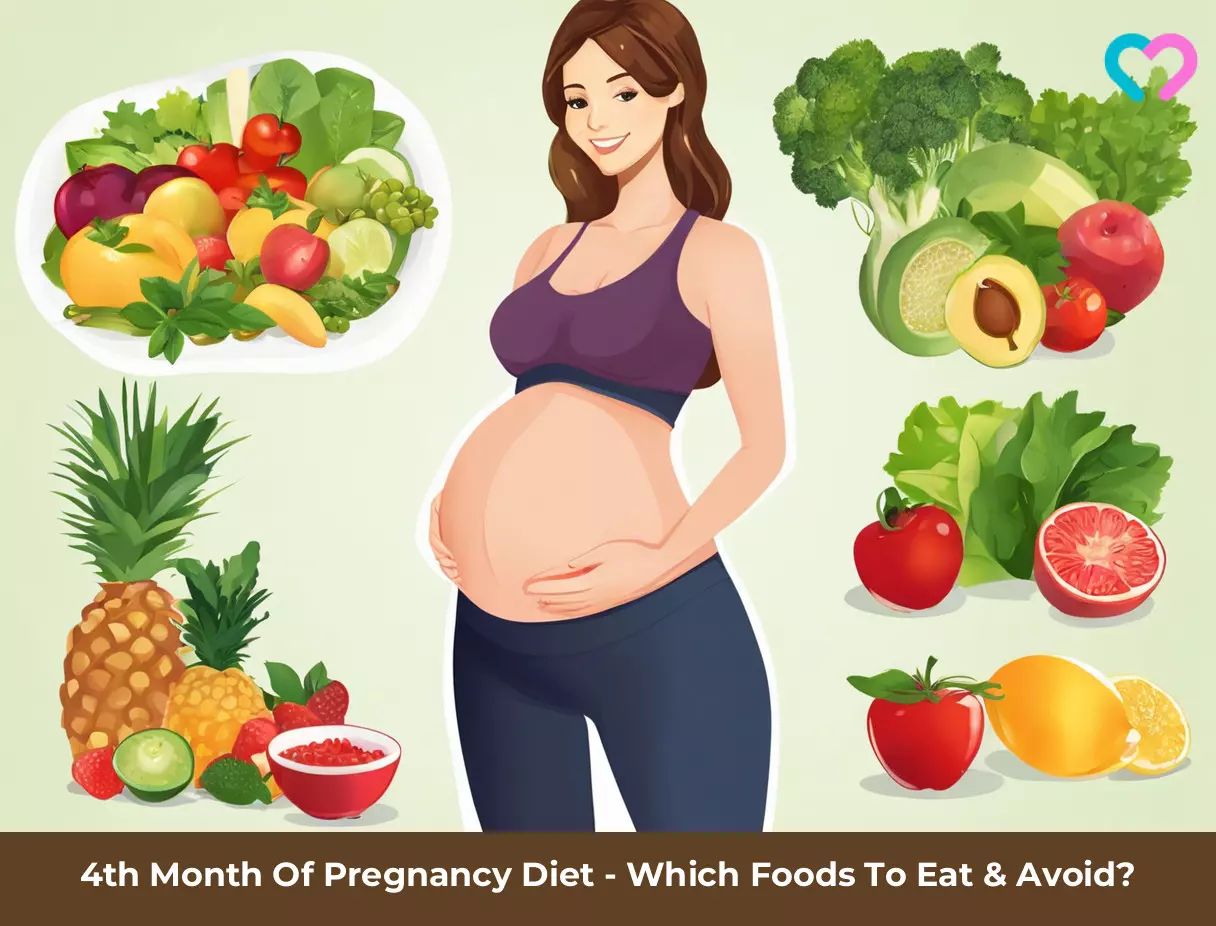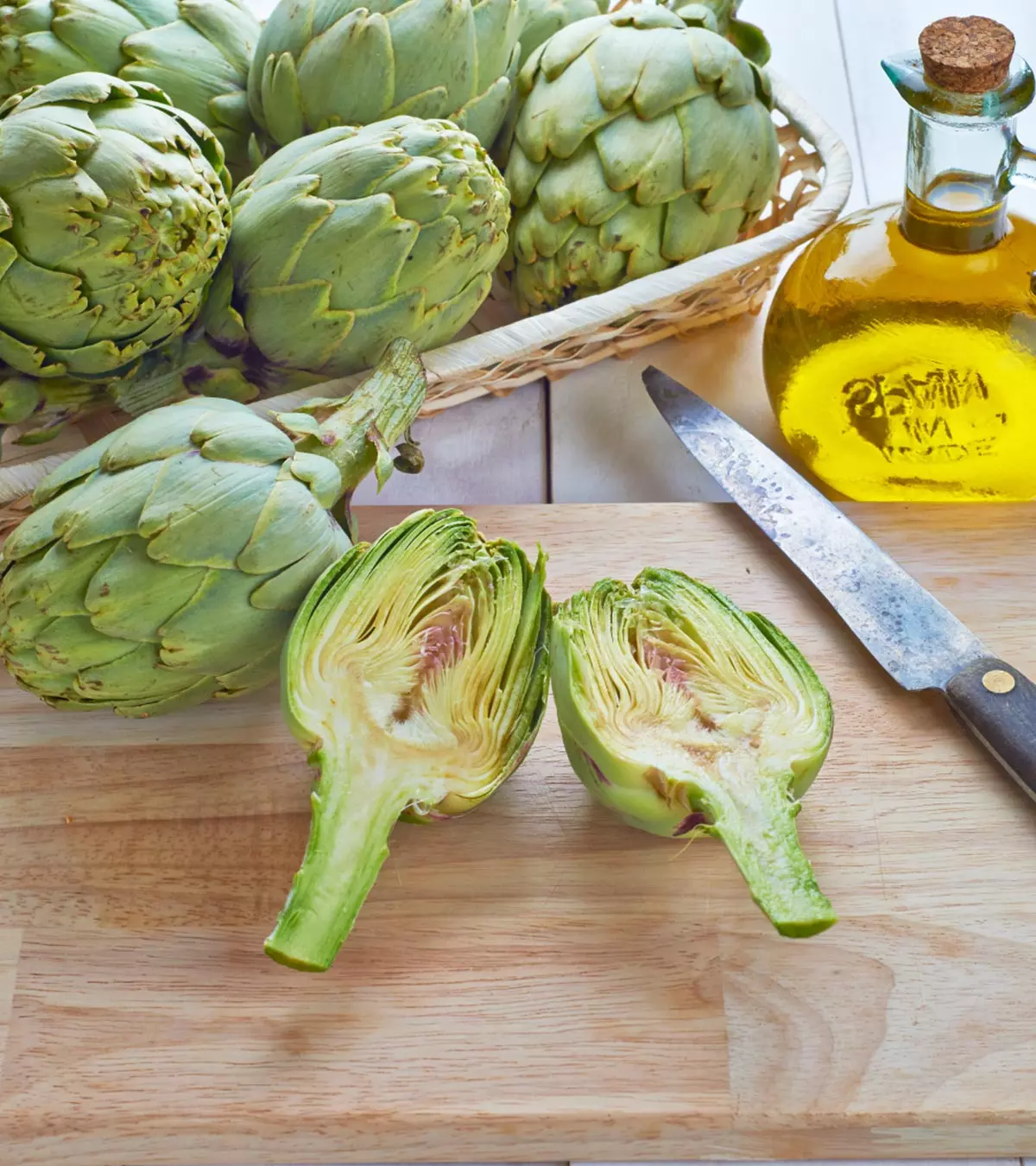
Image: ShutterStock
If you have entered the second trimester of your pregnancy, read this post for useful tips on planning your 4th-month pregnancy diet. This trimester may be much more relaxed and comfortable than the first. Often referred to as the honeymoon period of pregnancy, this is the time when the uncomfortable symptoms disappear.
As you enter the 4th month, you will likely be free from nausea, bloating, vomiting, etc. So, naturally, you would want to gorge on your favorite foods that you missed out on during the first trimester. However, it is important to know what you should and should not have for a healthy and safe pregnancy.
Read on to know about the foods you need to include in your 4th-month pregnancy meals and those you need to avoid.
Key Pointers
- The 4th month pregnancy diet should promote growth and nourishment.
- The diet should include foods high in fiber, essential fatty acids, dairy, meat, fresh fruit, and iron-rich meals.
- Avoid foods such as maida, soft and unpasteurized cheese, alcohol, caffeine, and raw or undercooked meats.
What’s Happening With The Baby?
The aim of the second trimester is growth. By the fourth month of pregnancy, your baby is fully formed. Every organ, including brain, kidneys, spinal cord, eyes, toes, fingers, lungs and heart, is formed and fully functional.
During this month, significant brain development occurs, including forming neural connections vital for the onset of other critical reflexes and cognitive functions later in life. A diet rich in omega-3 fatty acids can support this crucial brain growth.
The body works hard to calcify the baby’s bones and to finetune all the organs. Therefore, your fourth month of pregnancy diet needs to be more growth-promoting and nourishing. Here are some diet dos and don’ts for your fourth month of pregnancy (1).
 Quick fact
Quick factThe Fourth Month: What to Eat
A diet chart for pregnant women should contain various foods from different food groups. Here’s a sample plan you can follow during the 4th month of pregnancy.
1. High Fiber:

Image: Shutterstock
This is the perfect time to start building a foundation for freedom from constipation in the later part of pregnancy and after delivery. So, add lots of fiber to your 4th-month pregnancy diet, and that, too, in each meal.
Eat plenty of high-fiber foods like whole grains, oats, and green vegetables rich in complex carbohydrates, vitamins, and minerals, such as folate. In addition, opt for iron-fortified whole wheat bread instead of regular white bread (2).
 Point to consider
Point to consider2. Essential Fatty Acids:
Besides other things, the baby and your body need these acids to lower the risk of premature labor, low birth weight, and mental and cognitive retardation in the baby. Therefore, experts advise adding sufficient omega 3, 6, and 9 fatty acids to the maternal diet. Foods like freshwater fish, tinned tuna, nuts, and olive oil are nutritious foods you can safely eat to meet your essential acid needs (3).
3. Dairy Products:
Your calcium requirement during pregnancy increases. Hence, your doctor will probably prescribe you a vitamin D and calcium pill on entering the fourth month of pregnancy. They will also give you dietary tips to raise your daily calcium intake.
4. Meats:
If your nausea is gone, you can include meat in your diet; but do make sure it is washed and cooked very thoroughly.
Undercooked meat may carry deadly viruses and bacteria. If you are tempted (or obligated) to eat out, order tandoori or roasted meat as it is sure to be cooked through and through. Lean meat, like chicken, eggs, and fish, are high-protein foods women can safely consume during pregnancy.
 Did you know?
Did you know?5. Fruits:

Image: Shutterstock
Fresh fruits are a must throughout pregnancy as they have loads of vitamins and minerals; plus, they are high in water content and/or fiber. Fresh fruits are preferable as they do not contain preservatives and artificial coloring agents. The fourth month of pregnancy may trigger acidity and heartburn. Therefore, fresh seasonal fruits of different colors should be an integral part of prenatal nutrition in the fourth month of pregnancy.
6. Iron-Rich Foods:
The growth spurt of the fetus, starting from the fourth month, needs more iron. In addition, your body also needs to make 3-6 extra liters of blood for your pregnancy (hence the famed preggers glow!). An iron-rich diet supports increased blood production during pregnancy, which helps in proper fetus development. Add foods like nuts, dhaals, eggs, dried fruits, and whole wheat products to your diet. Also, consult your doctor before starting any iron supplements (4).

The physiologic requirements for iron of pregnant women
Source: Physiologic requirement for iron in pregnant women, assessed using the stable isotope tracer techniqueSource: Physiologic requirement for iron in pregnant women, assessed using the stable isotope tracer technique
Always consult your healthcare provider before making significant changes to your diet, as individual nutritional needs can vary widely during pregnancy. They can offer personalized recommendations based on your health history and pregnancy progression. Besides adding the foods mentioned above to your diet, reduce salt intake and avoid artificial sweeteners during pregnancy as they may affect fetal development. Also, increase your water intake to maintain optimum hydration levels.
Fourth Month: What NOT to Eat
Though the crucial first trimester is over and you can now look forward to your baby and its antics, there are still some precautions & foods that need to be avoided in your 4th month of pregnancy diet for maternal and fetal health (5).
1. Soft Cheese:

Image: Shutterstock
Often these cheeses are made from unpasteurized milk and may harbor harmful bacteria and viruses. Therefore, avoid soft cheeses of all kinds. You can always choose foods containing hard cheese as it has low water content. The low water content makes it less prone to disease causing microorganisms (6).
2. Maida:
Maida or refined flour becomes a dietary concern in the fourth month as refining reduces nutrient and fiber content and may cause constipation(7)
. Although constipation isn’t a major concern, when ignored it can cause postpartum hemorrhoids. So, say no to foods like samosas, momos, noodles, etc.
3. Sea Fish:

Image: Shutterstock
As much as possible, avoid sea fish as they are loaded with methylmercury, a compound that can cause mental retardation in the fetus. If you cannot do without fish, go for freshwater varieties (6).
4. Street Food:
Though food cravings can make street food appear too tempting, you must avoid junk foods during pregnancy as much as possible. There is no guarantee of the cleanliness and freshness of the foodstuffs and the containers. Street food can cause food poisoning and other water-borne diseases like typhoid. So, prepare a plate of that chaat, pakodis, and dahi bhalla at home itself.
5. Excess Of Dried Fruits:
Consuming a cup of dried fruits in pregnancy is good for you. However, avoid taking too many dried fruits during the fourth month to avert the risk of any side effects. Dry fruits are very rich and warm in essence, and for some women, can cause untimely contractions.
6. Licorice:

Image: Shutterstock
Called mulethi in Hindi, this otherwise wonderful herb can wreak havoc on the pregnancy by triggering contractions. Therefore avoid licorice and licorice extracts, and remember that some candies, toothpastes and Indian gravies also contain licorice (8).
 Things to know
Things to know7. Caffeine:
Mothers are also advised to limit themselves from consuming beverages containing high levels of caffeine or avoid them if they can. Some of the common sources of caffeine include coffee, chocolates, tea, and other food items containing these ingredients. This is because even though the baby is fully formed, the baby’s body cannot yet fully metabolize caffeine. Caffeine also reduces enough blood from being supplied to the fetus by constricting blood vessels in the placenta. Therefore, caffeine intake during pregnancy must be limited.
Frequently Asked Questions
1. Can I feel the baby in four months of pregnancy?
Yes. You may feel the quickening (beginning of the feeling of fetal movements) from as early as 16 weeks of pregnancy, i.e., at the end of the fourth month. It may feel like butterflies fluttering, bubbles popping, or tiny muscle spasms or light rolls (9).
2. Which fruit is the best for the fourth month of pregnancy?
During the fourth month of pregnancy, you should include fresh fruits, including bananas, citrus fruits, pears, apples, grapes, and dried fruits. However, make sure to eat these fruits in moderation (10).
3. How much weight gain is okay in the fourth month of pregnancy?
It has been recommended that women with normal pre-pregnancy weight gain 2 to 4 pounds (1 to 2 kilograms) during the first trimester (three months) and then one pound (0.5 kilograms) every week for the remainder of the pregnancy (10).
4. Should I take prenatal vitamins during the fourth month of pregnancy?
Yes, taking prenatal vitamins is crucial during pregnancy, especially during the second trimester. Consult your doctor to learn the right prenatal vitamin combination and dosage for you.
5. What maternal changes occur during the fourth month of pregnancy?
At 4 months pregnant, you may develop heavier and fuller breasts. You might experience some digestive problems, such as heartburn, due to hormonal fluctuations. Additionally, an increased blood flow may lead to bleeding gums or nasal stuffiness. Furthermore, the uterus continues to grow during this period and the nausea usually subsides (12).
When planning your 4th-month pregnancy diet, remember that this is the start of your second trimester, where your baby experiences substantial growth. While your pregnancy-related symptoms may subside, you must continue to consume a well-balanced diet containing organic foods rich in growth-promoting and nourishing nutrients. You should also be cautious about foods that might harm your pregnancy. Eating well during the fourth month can ensure the baby’s health and lay the foundation for robust development in the subsequent trimester. If your dietary intake looks insufficient to meet your nutritional needs, you may take prenatal vitamin supplements under medical guidance.
Infographic: What You May Eat In Your 4th Month Of Pregnancy
During the fourth month, as your body changes to accommodate the growing baby, you must ensure you eat all the necessary nutrients for a healthy baby and pregnancy. This infographic provides an organized chart to prepare your daily meals to get the proper nutrients.

Illustration: Momjunction Design Team
Elevate your pregnancy experience with optimal prenatal nutrition. Unearth five essential tips for nourishing both your body and baby in this enlightening video. Acquire expert advice for maintaining a wholesome pregnancy diet.
Illustration: 4th Month Of Pregnancy Diet - Which Foods To Eat & Avoid?

Image: Stable Diffusion/MomJunction Design Team
References
- Michelle A. Kominiarek; (2016); Nutrition Recommendations in Pregnancy and Lactation.
https://www.ncbi.nlm.nih.gov/pmc/articles/PMC5104202/ . - Rachelle A. Pretorius and Debra J. Palmer; (2021); High-Fiber Diet during Pregnancy Characterized by More Fruit and Vegetable Consumption.
https://www.ncbi.nlm.nih.gov/pmc/articles/PMC7824257/ - Nutrition during pregnancy.
https://www.acog.org/womens-health/faqs/nutrition-during-pregnancy - Nutrition and physical activity.
https://app.magicapp.org/?language=en - Prenatal nutrition.
https://med.umich.edu/hits-redirect.html?url=https://www.uofmhealth.org/conditions-treatments/nutrition-services/food-and-nutrition-while-hospital/_pdf/hetm-2017/0417-prenatalnutrition.pdf - People at Risk: Pregnant Women.
https://www.foodsafety.gov/people-at-risk/pregnant-women - Whole Grains.
https://nutritionsource.hsph.harvard.edu/what-should-you-eat/whole-grains/ - Herbs and Supplements to avoid.
https://winchesterhospital.org/health-library/article?id=35536 - Quickening in Pregnancy.
https://my.clevelandclinic.org/health/symptoms/22829-quickening-in-pregnancy - An Essential Guide on What to Eat During Pregnancy.
https://www.fhcsd.org/prenatal-care/what-to-eat-during-pregnancy/ - Managing your weight gain during pregnancy.
https://medlineplus.gov/ency/patientinstructions/000603.htm - What happens in the fourth month of pregnancy?
https://www.plannedparenthood.org/learn/pregnancy/pregnancy-month-by-month/what-happens-fourth-month-pregnancy
Community Experiences
Join the conversation and become a part of our nurturing community! Share your stories, experiences, and insights to connect with fellow parents.
Read full bio of Dr. Kire Stojkovski
Read full bio of Anshuman Mohapatra
Read full bio of Swati Patwal
Read full bio of Dr. Joyani Das





















